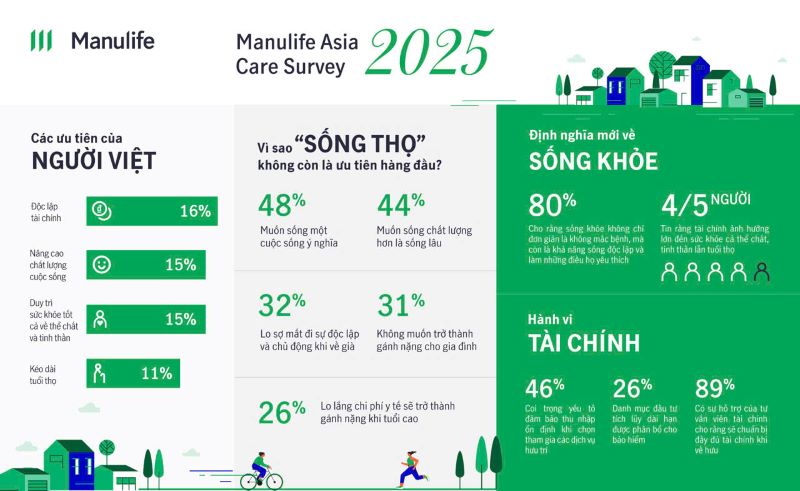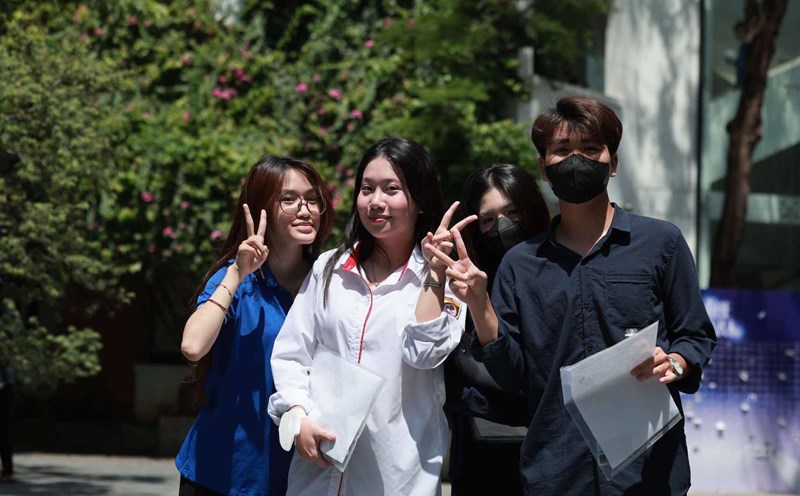Good quality life, health and financial independence are more important than prolonging life
According to the United Nations' World Population Prospects 2024 report, the average life expectancy of Vietnamese people will increase from 74.6 years old (2023) to 78.9 years old (2050). However, Manulife Asia Care survey shows that "living longer" is no longer the top wish of today's people. Although surveyed people predict the average life expectancy of Vietnamese people will be at 80 years old, they hope to live to 76, which is 4 years lower than the average prediction.
More specifically, among the top wishes today, only 11% of Vietnamese people want to " live a long time". Meanwhile, 16% want to achieve financial independence, 15% prioritize a quality life, 15% want to maintain good health both physically and mentally. Notably, in the 25-34 age group, 1 in 4 people want complete financial freedom.
Explaining why living longer is no longer a top wish, 48% of respondents said they wanted a meaningful life and 44% wanted a quality life rather than living longer. In addition, 32% are afraid of losing their independence and proactiveness when they are old, 31% do not want to be a burden to their family, and 26% are worried that medical expenses will become a burden when they are old... This shows a new way of looking at life of Vietnamese people, which is to live quality, healthy, meaningful and financially independent, not simply prolonging life.

Is health yellow, or is gold health?
The survey results show that Vietnamese people seem to be pursuing a new definition of the journey to live healthy, where living healthy is not simply not suffering from disease, but also the ability to live independently and do what they love. Specifically, 80% of surveyed people expressed their agreement with the viewpoint of living healthy is the ability to live independently and do all the important things for me, instead of just trying not to get sick.
The survey results also show that expectations for a long and healthy life are a result of three key factors, including physical health (40%), mental health (32%), and financial health (28%). Notably, financial health has a clear impact on the remaining factors, with 83% of survey participants saying that financial stability is the most important factor in maintaining mental health; 81% saying that stable finances help maintain physical health; and 79% saying that a solid financial plan has a direct impact on life expectancy. Even financial health has a strong impact on mental health (88%) - higher than other factors such as family (86%), purpose of life (86%), social relationships (80%).

Regarding Vietnamese people's current financial behavior, Manulife Asia Care 2025 survey shows that preparing well for retirement is a key factor, with cash, savings, retirement programs and real estate being the top priorities. In addition, although cash is still the dominant accumulation channel with a rate of 46%, the survey results show that insurance and other long-term investment tools are increasingly being focused on by people with priority allocation rates including: insurance (26%), stocks (11%), investment funds (9%), bonds (7%).
Ms. Tina Nguyen, General Director of Manulife Vietnam, shared: This year's Manulife Asia Care survey has pointed out a quite interesting new trend in the perspective of Vietnamese people on life. Prioritizing a healthy life, quality life and the desire for financial independence instead of living longer shows that Vietnamese people are increasingly interested in and proactively taking care of their physical, mental and financial health. This is truly an opportunity for the insurance industry, including Manulife Vietnam, to make more efforts and creativity to meet the needs of health care and financial planning for people".
For detailed information about the survey, see here.










